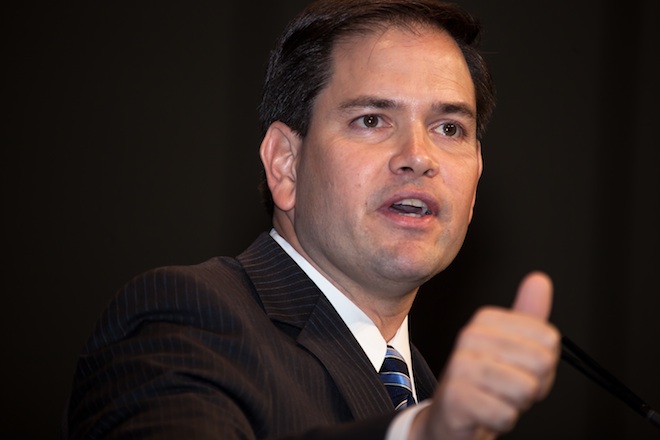In a dinner with wealthy fundraisers, Mitt Romney dismissed 47 percent of voters as hopeless “victims” who would never accept personal responsibility, let alone a Republican president. The next crop of presidential hopefuls is determined to not make the same mistake.
Two of the GOP’s best and brightest offered their most detailed policy speeches since the election at the Jack Kemp Foundation awards dinner on Tuesday. And the unmistakable theme was that Romney’s patrician philosophy had to go.
“Both parties tend to divide Americans into ‘our voters’ and ‘their voters,'” Rep. Paul Ryan (R-WI), Romney’s running mate, told the audience. “Let’s be really clear: Republicans must steer very clear of that trap. We must speak to the aspirations and anxieties of every American.”
It was a far cry from Romney’s top adviser, Stu Stevens, who consoled Republicans after the election by showcasing his candidate’s strength with wealthy and white voters.
Ryan, best known for his plan to slash safety net spending, focused his speech overwhelmingly on America’s poorest citizens, a group often left out of stump speeches in 2012 as both parties focused on winning the middle class. He used the word “poverty” 15 times in his prepared remarks. But he positioned his calls for reduced spending on anti-poverty programs as consistent with his concern for struggling families.
“We haven’t applied the welfare-reform mindset with equal vigor across the spectrum of anti-poverty programs,” he said. “In most cases, we’re still trying to measure compassion by how much we spend — not by how many people we help.”
Sen. Marco Rubio (R-FL) put just as much emphasis on the disadvantaged, frequently referring to his own roots as the son of poor Cuban immigrants. He called for an expansion of charter schools and voucher programs to help parents find opportunities for their children. He suggested greater cooperation with churches and other local institutions in impoverished neighborhoods to help “confront societal breakdown” that traps families in poverty. And while he said Congress should “protect our nation’s safety net programs,” he stressed that he did not favor tax increases on the wealthy to do so and that “these programs must be reformed to enhance family stability, financial opportunity, education and a culture of work.”
“It is not the ever expanding reach of government, but rather having access to the benefits of thriving economy that allows the poor to rise into the middle class,” Rubio said. “Not by making rich people poorer, but by making poor people richer.”
For the most part, neither candidate suggested a major break with traditional GOP policy prescriptions. Rubio praised Community Health Centers, an area where the House GOP has tried to cut funding for in recent years, but it’s hardly a heretical position. Based on remarks by Ryan, Rubio, and other rising politicians like Bobby Jindal, the GOP’s next generation appears convinced that a more inclusive tone can salvage the party’s platform as is.









